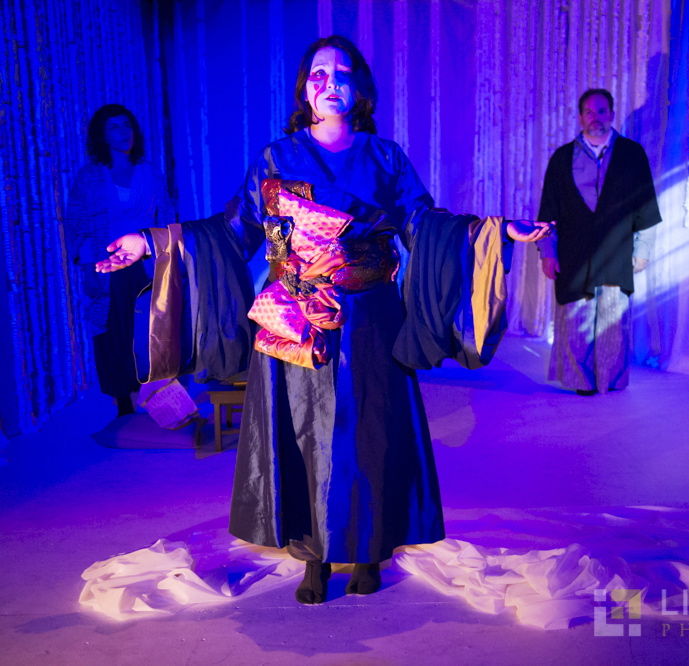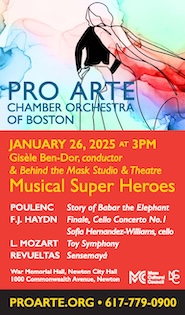Guerilla Opera scores another success with Salkind-Pearl’s “Troubled Water”

Aliana de la Guardia as Oriki in Mischa Salkind-Pearl’s “Troubled Water” at Guerrilla Opera. Photo: Liz Linder
There are several episodes in the life of Japanese writer Natsuko Higuchi that would suit dramatic treatment. She was born and raised in poverty and her father and brother died young, leaving the women in her family to fend for themselves. Despite such circumstances the writer won success as a serious artist—she published her work under the pen name Ichiyou—an unusual feat for a woman in late-nineteenth-century Japan.
It’s tragic, then, that her life came to an abrupt end at the age of 24. Indeed, her story, as composer Mischa Salkind-Pearl put it, is “almost too operatic.”
Fittingly, her life and work has found new life through a new opera. Troubled Water, written by Salkind-Pearl and librettist Frederick Choi, received its world premiere Friday night at the Zack Box Theater. And bringing the story to vivid life were the talented singers and musicians of Boston’s enterprising company, Guerilla Opera.
Choi’s libretto combines episodes from Higuchi’s biography with scenes drawn from her writings that reflect the world in which she lived, where social restrictions frame underlying human tensions. The characters central to her writing were people who were social outcasts, especially courtesans who were often miserable with their situations and are free only to regret lost friendships. Some even turn away proposals for marriage because men, we learn, can’t be trusted.
Higuchi is timid though she expresses a driving desire to write serious literature. She finds a way into publishing through Nakarai, a writer of popular fluff. It’s a strange relationship: Nakarai is the epitome of the compromised artist who owns no more than a handful of books, and the widely-read Higuchi longs to write memorable work.
Salkind-Pearl’s score deftly captures the characters’ psychosis and makes for drama that touches the head rather than the heart. His music has been lately receiving performances around the country, and in Boston the Ludovico Ensemble, for which Salkind-Pearl serves as composer-in-residence, is offering performances of his works this season.
It is easy to hear why Salkind-Pearl’s music is achieving such acclaim. It is gorgeous and chock-full of silky color effects. The opera’s instrumental interludes move in a ghostly collage of bent pitches, marimba rolls, and spare lines, played expertly by Amy Advocat (clarinet), Kent O’Doherty (saxophones), Lilit Hartunian (violin), and Mike Williams (percussion). In other moments, Salkind-Pearl’s score is warmly tonal, the lines fusing into glowing chords as in a hymn. His vocal writing adheres to speech rhythms, which make for clear delivery on the part of the singers.
Sophie Michaux deftly captured Higuchi’s reclusive personality and penetrating intelligence, but didn’t shy away from expressing the writer’s anger when she discovers that Nakarai had betrayed her trust. After she finds success, Higuchi eventually strikes out on her own, and Michaux’s portrayal only grew more self-assured. Michaux sang the role with a silky soprano voice, her tone a flute-like blend with the instrumental ensemble.
Brian Church and Aliana de la Guardia, both Guerilla Opera regulars, performed multiple roles in scenes drawn from three of Higuchi’s stories: Takekurabe (Child’s Play), Nigorie (Troubled Water), and Wakare Michi (Separate Ways). Church sang with a clear, delicate tenor that brought a touch of pitiful sorrow to the role of Tomonosuke, a patron who is in love with the courtesan Oriki. And Church deftly captured feelings of betrayal as Kichizou, a young, destitute umbrella-maker’s assistant who learns that his friend Okyou is to be taken as a wife. In a single anguished moment, Church acidly utters, “Never speak to me again.”
De la Guardia was equally solid as a singer-actor. As Okyou, she was playful, her nimble soprano voice making Salkind-Pearl’s spare, speech-like musical lines sound rich and deep. The singer also found the palpable fear of Oriki, huddling into a corner as her misery overtakes her.
The production, developed by stage director Allegra Libonati and production designer Julia Noulin-Mérat, was seamless with the fictional and biographical scenes unfolding gracefully. Sets were minimal—throw pillows, small chests, and table—but effective, yet another sign that one does not need expensive elements to tell a gripping story.
The scrim and white curtains, upon which were displayed excerpts from Higuchi’s writing and beautiful, curved Japanese letters, provided the visual spectacle. The costumes consisted of traditional Japanese wraps and kimonos.
In an age when opera companies are buckling under increasing financial pressures to stage elaborate performances, Guerilla Opera is a breath of fresh air. With a shoestring budget, the company has brought a host a new and enticing works into existence. Troubled Water is another exemplary show in a string of worthy repertoiry. It is a mesmerizing work, and received a memorable performance.
Troubled Water runs though September 25 at the Zack Box Theater. guerillaopera.com.
Posted in Performances




Posted Sep 20, 2015 at 10:25 am by Olga Richter
Very proud of my niece Aliana de la Guardia!